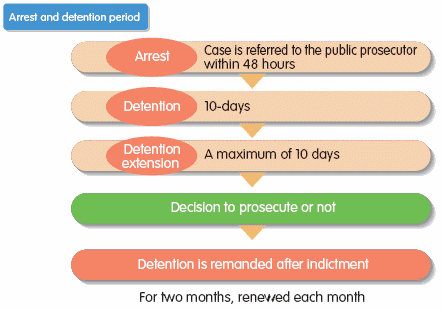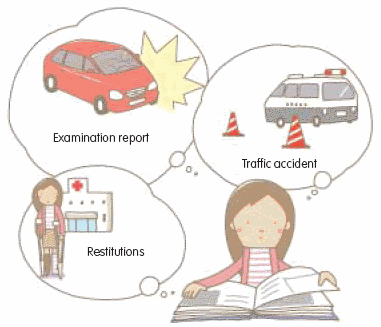


When someone falls victim to a crime, they can report the incident to the investigating authorities by submitting an incident report. Such reporting usually initiates an investigation. In addition, victim can file a complaint seeking punishment of the perpetrator by reporting the facts of the crime to the investigating authorities. People other than the victim can make accusations seeking punishment of the perpetrator also by reporting the facts of the offense to the investigating authorities.
Also, in cases of rape, indecent assault, or other such offenses classified in Japanese law as crime indictable upon a complaint, the victim needs to submit a formal complaint, for the perpetrator to be criminally prosecuted.
 |
Please explain about the period of time in which a victim of a sexual offense needs to file a complaint. | |
 |
To respect the privacy and other rights of the victim, a formal complaint (i.e., victim’s request for punishment of the perpetrator) has to be filed to a police officer or public prosecutor for prosecution to take place in cases of rape or sexual assault, crimes against property, of defamation, and other offenses. Such crimes where a formal complaint by the victim is required for the perpetrator to be prosecuted are described as crime indictable upon a complaint, and the period of time in which such complaint must be submitted is generally within six months from the day that the perpetrator’s identity became known to the victim. However, due to psychological trauma caused by the offense, or other circumstances surrounding the case, it may be difficult for victims of sexual offenses to decide within a short period of time whether or not to file a formal complaint. Therefore, for sexual offenses that are indictable only upon a complaint, a formal complaint can still be filed even though the six - month period mentioned above has passed, until the statute of limitations (the period of time in which a public prosecutor is able to bring a prosecution against an offender : ten years for rape, seven years for indecent assault) has expired. It should be noted that the collection of evidence becomes more difficult as more time passes. Therefore, if a victim desires the offender to be punished, it is recommended that one should call up the courage and file a complaint at an early stage.  |
|

Investigations will commence with the arrest of the offender, and on other occasions will commence without an arrest. When the police arrest a suspect, they must refer the case to the public prosecutor within forty-eight hours. If the public prosecutor decides it is necessary to detain the suspect to prevent the suspect from absconding or destroying evidence, they will make a request for detention to the court. Although the detention period is ten days, in the case of unavoidable circumstances, a further ten-day extension will be permitted. The public prosecutor will usually carry out an investigation during this detention period, and will make a decision whether or not to prosecute. Cooperation from the victim, such as agreeing to be interviewed, is essential because the victim knows the incident best. Even where the police have already conducted the interview, please understand that sometimes the public prosecutor needs to double-check the information. The public prosecutor will be considerate of the emotions and the reputation of the victim during such interviews.


Upon completion of the investigation, the public prosecutor makes the decision on whether or not to prosecute the case. Decision of non-prosecution can be reported to the Committee for the Inquest of Prosecution for review. Alternatively, for crimes including abuses of authority by a public officer, request to commit the case to a court for trial can be made to the District Court having jurisdiction.
 |
Please explain about making requests to the Committee for the Inquest of Prosecution regarding non-prosecution decisions. | |
 |
When a public prosecutor decides not to prosecute an offense, victims or accusers can request the Committee for the Inquest of Prosecution to conduct an inquest. Victims’ bereaved families can also make such request. Additionally, people making such request can submit legal opinions and other documentation to the Committee for the Inquest of Prosecution. The Committee for the Inquest of Prosecution will conduct an inquest into the case submitted to them, and will decide on whether prosecution or non-prosecution is appropriate. If decision is rendered as prosecution is appropriate or non-prosecution decision was inappropriate, the public prosecutor will reopen the investigation. From May 2009, if the Committee for the Inquest of Prosecution decides that it is appropriate to prosecute and the public prosecutor decides on non-prosecution disposition as a result of re-investigation, the Committee may reexamine the case and render the decision to prosecute the case. If such decision were rendered, the attorney designated by the court will prosecute the case and will play the role of a public prosecutor in trial proceedings. The Committee for the Inquest of Prosecution is located in the district courthouses, so please ask at the district courthouse regarding procedures to make inquest requests.  |
|

As a general rule, case files of non-prosecution cases are not available for inspection.. However, the prosecutor’s office has been granting requests from courts undertaking related civil actions, and bar associations for evidence such as examination reports of traffic accidents.
Victims of cases subject to the victim participation system (refer to page 25) can also inspect such records as the examination report even for the purpose of “understanding the details of the case,” if it will not obstruct the investigations or trials and will not infringe the privacy of those involved.
Furthermore, inspection of records such as the examination report is also allowed for victims of cases not subject to the victim participation system, if it is deemed necessary to exercise their rights to claim compensation for damages or other rights under the condition that it will not obstruct investigations and trials and will not infringe the privacy of those involved.
